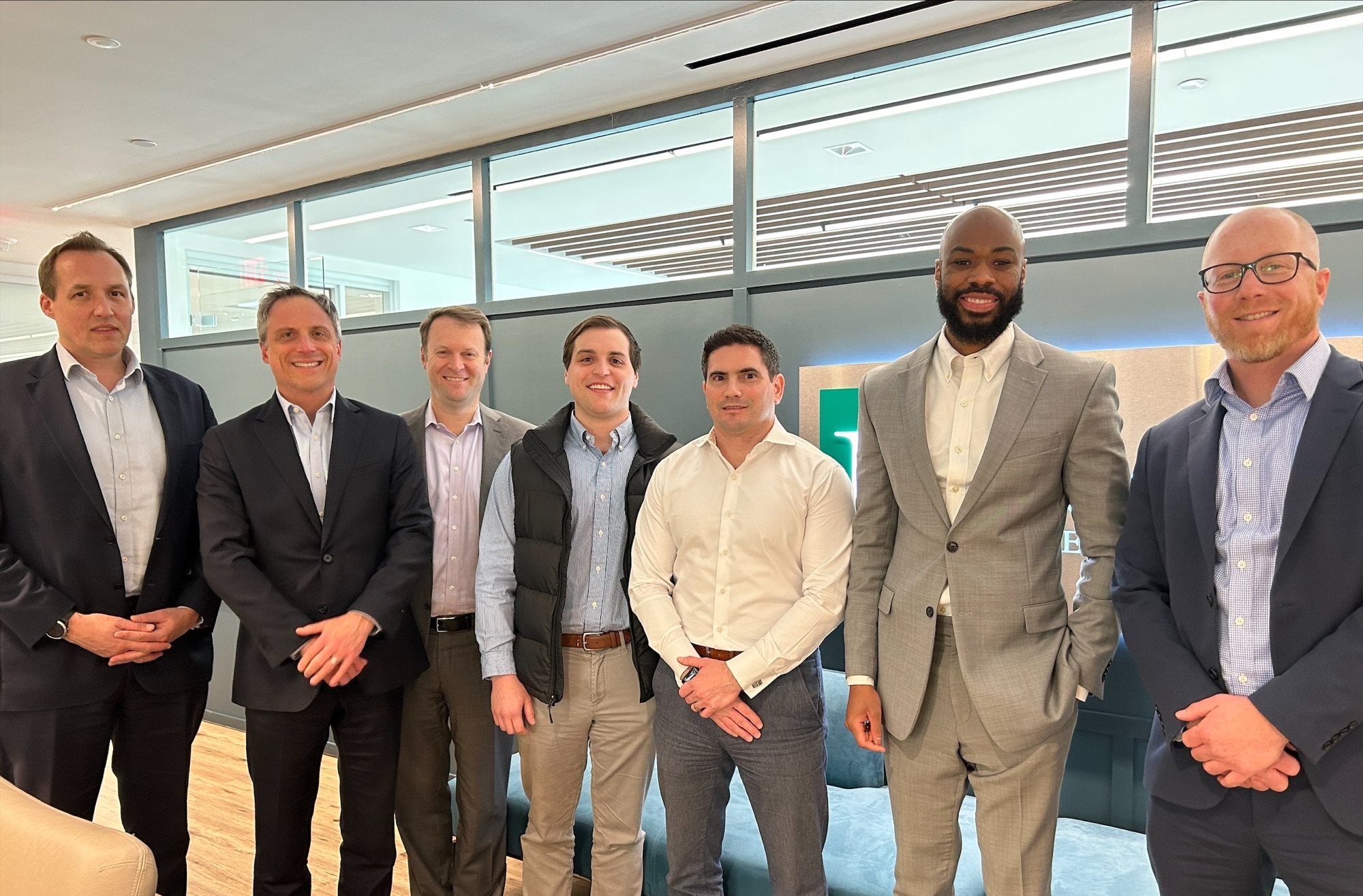(Photo: Senior international bond specialists from T. Rowe Price made a stop at Mason Headquarters to discuss the debt ceiling, rates of inflation and the future of the U.S. dollar as the global currency.)
Reston, VA – While many amateur American investors fixate on domestic concerns around the debt ceiling, inflation and the future of the U.S. dollar as the global currency, the investment team at Mason Investment Advisory Services, Inc. is coached to examine investments from a much broader scope.
“It’s a big world out there,” said Terry Moore, CFA®, a vice president and senior portfolio manager with T. Rowe Price. “There’s usually something going on in the world that’s attractive.”
Mr. Moore stopped by Mason headquarters, along with his colleagues Kenneth Orchard, CFA®, and Andrew Keirle, both senior portfolio managers in the Fixed Income Division and members of the Global Fixed Income Investment team at T. Rowe Price, to discuss international bond investment strategies.
Mason’s research team led by Thomas Pudner, CFA®, CPA, CFP and MST, organized the discussion as part of the firm’s ongoing effort to routinely assemble the industry’s brightest minds for discussion of investment theory and best practices – for the benefit of its advisors, and by extension, its clients.
Discussion kicked off with a question about the future of the U.S. dollar as the global currency from Mason’s Senior Investment Consultant & Director of ESG Research Claudelle Géhy, CFA®.
“The short answer is that [the U.S. dollar] is by far the predominant means of exchange and store of value globally when it comes to financial markets, still used in about 90 percent of trade bargains or contracts,” said Mr. Keirle, who is based in London. “You always get the question about dollar dominance when the dollar starts to weaken. I think it’s somewhat overblown.”
Mr. Keirle is a vice president and a lead portfolio manager who started at T. Rowe Price in 2005. He helps to drive a number of his firm’s emerging markets bond strategies and global fixed income strategies.
During the two-hour event, Mason advisors also voiced client concerns about potential fallout from the ongoing negotiations over the country’s debt ceiling.
“We won’t have a default, but it’s a non-zero probability” Mr. Moore said. “No one has an edge on calling what this Congress is going to do.”
The probability of the Treasury not being able to pay the debts seems to be “very, very low,” Moore said. “Politicians don’t want to be seen as the ones causing all this pain for Main Street,” he said.
Mr. Moore is based in Baltimore, Md. and works on the Global Bond and Customized Fixed Income Solutions teams at T. Rowe Price. His investment experience began in 1994, and he’s been with T. Rowe Price since 2009.
While some industry experts say the U.S. is already experiencing a mild recession, Mr. Moore said he thinks a recession “is not imminent,” and a variety of variables driven by global politics and continuing fallout from Covid-19 have left the investment market “confused” and harder to predict.
People are still coming out of the “Covid cave,” said his colleague Mr. Keirle, adding that consumer psychologies around “revenge travel” and “trying to make up for lost time” have perpetuated heightened inflation, which has prompted the Federal Reserve to hike interest rates in each of its last 10 meetings.
Further, shifts in the labor market such as early retirements due to Covid-19, Baby Boomers leaving the workforce, immigration restrictions and increasing costs for businesses to borrow money are also contributing to stubbornly persistent inflation, Keirle said.
Though publicly, the Chairman of the Federal Reserve Jerome H. Powell has said The Fed’s goal is to bring inflation down toward 2 percent, Keirle said it likely would take a recession to get there.
Nevertheless, the consensus was The Fed has still “got more hiking to do.”
“Inflation is on track to trend down to the threes by the end of this year,” said Mr. Keirle. “If in six to nine months we get into threes and staring at a softening economy with election around the corner, we’ll probably see The Fed move over to growth side of their [dual] mandate.”
The Federal Reserve is charged with maximizing employment and maintaining price stability, known colloquially as the “dual mandate.”
In 1977, Congress amended the Federal Reserve Act, directing the Board of Governors of the Federal Reserve System and the Federal Open Market Committee to “maintain long run growth of the monetary and credit aggregates commensurate with the economy’s long run potential to increase production, so as to promote effectively the goals of maximum employment, stable prices and moderate long-term interest rates.”
The outcome of the Fed’s rate hikes is likely to be a slightly weaker U.S. dollar, Mr. Orchard said.
Mr. Orchard, who is also based in London, began at T. Rowe Price in 2010, initially as a sovereign analyst and with responsibility for the European macro-outlook.
Atypical market conditions over the past couple of years have produced marketplace volatility and investor uncertainty but have also produced “some good hideouts” around the globe for investors and wealth advisors who know where to look, Mr. Moore said.
Is your investment strategy built to realize your long-term investment goals? Call 703-716-6000 or email info@masoncompanies.com to speak with a Mason advisor today.
Past performance is not indicative of future results. The information presented is not intended to constitute an investment recommendation for, or advice to, any specific person.





